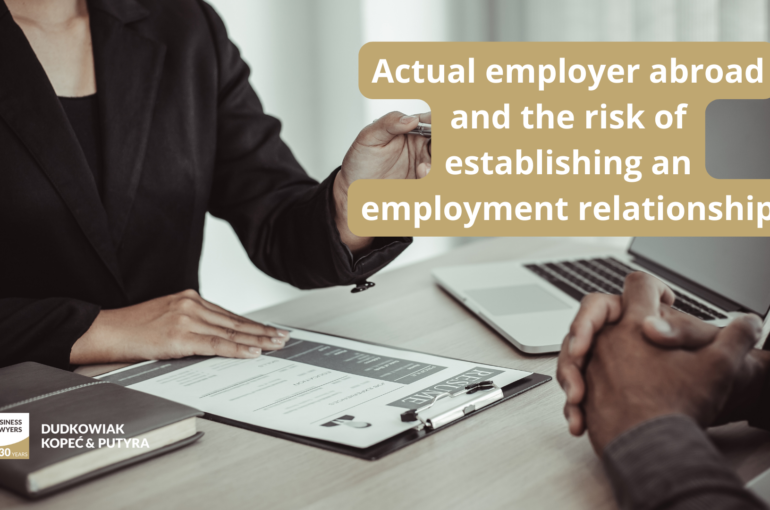Basic elements of the Compliance policy in the workplace. Part 3 anti-mobbing procedure
1. Mobbing – definition and scope.
Anti-mobbing mechanisms are another element of a well constructed compliance policy. According to the Labour Code, mobbing means “acts or behaviour in relation to an employee or directed against an employee, with the effect of persistent and long-term harassment or intimidation of an employee, resulting in a decreased evaluation of his professional abilities, or which is aimed at or results in the humiliation or ridicule of the employee, or the isolation or elimination of the employee from the group of co-workers.”. For many employers and employees the biggest problem is determining whether behaviour is mobbing. Jurisprudence can help in this regard. For example, the Court of Appeal in Wrocław, in the verdict of September 27, 2012, in the case ref. no. III A Pa 27/12, indicated that “Mobbing can also be expressed through constant interruptions, shouting, constant criticism and admonishment, humiliation, threats, avoidance of conversations, not allowing to speak, ridicule, limiting the ability to express one’s own opinion, informally prohibit talking to a harassed employee, preventing communication with others, as well as assigning unqualified and demeaning work, removing from responsible and complex tasks, workload, or not giving or taking any tasks away, etc. However, it should be emphasized that normal cultural enforcement of orders does not constitute mobbing, because official subordination arises from the nature of the employment relationship.”. Importantly, not every employee’s belief that he or she has experienced mobbing is a sufficient basis to assume that mobbing, in fact, took place, because the assessment whether mobbing has taken place must be based, above all, on objective criteria (so e.g.: Supreme Court in the judgment of February 11, 2014, in case ref. no. I PK 165/13). Therefore, when qualifying whether behaviour falls within the definition of mobbingu, employer should exercise great care and conduct an internal investigation.
2. Anti-mobbing procedure.
One of the basic tools for detecting and eliminating mobbing in the workplace is the anti-mobbing procedure. Importantly, the anti-mobbing procedure is not merely a document containing the relevant regulations on mobbing, but according to the views of the judicature, the anti-mobbing procedure in the workplace consists of a whole set of specific and systematic actions that the employer should undertake in order to fulfil statutory obligation to prevent mobbing.
Examples of actions that should be taken by the employer in order to introduce a comprehensive anti-mobbing procedure in the workplace include:
- identifying among employees how and whether they understand the phenomenon of mobbing,
- providing training on the matter of mobbing and how to prevent it,
- informing new employees of the anti-mobbing procedures,
- checking and adapting foreign anti-mobbing procedures to the Polish legal system (if applicable),
- introducing a document with anti-mobbing procedure / policy,
- translation of the anti-mobbing procedure into a language understood by each of employees (if applicable),
- announcing the introduction of anti-mobbing procedure and to making employees aware of its contents,
- taking appropriate preventive action as well as follow-up action when mobbing occurs at the workplace.
3. Elements of document with anti-mobbing procedure / anti-mobbing policy.
A key element of an anti-mobbing policy is a well-drafted procedure / anti-mobbing policy. A properly constructed anti- mobbing policy should include, inter alia, provisions on:
- the definition of mobbing and the purpose of adopting a procedure / policy,
- the employer’s anti-mobbing measures, such as conducting internal training and informing employees about the characteristics of mobbing phenomenon in the workplace,
- procedures which should be followed in the event of mobbing, specifying in particular:
- the elements and the manner of filing a complaint (it is important that a trace is left after filing),
- procedure for the appointment and composition of the anti-mobbing committee,
- the way in which complaints are dealt with by the committee, with particular reference to issues relating to: the clarification of the case; informing the complainant of the stages in the procedure; the deadlines of actions; the committee decision-making process and the transmission of the decision to the employer,
- the way in which minutes of the proceedings of the committee shall be taken and the records relating to investigations carried out shall be kept,
- the nature and character of the follow-up action taken by the employer,
- the commitment of employees to comply with the anti-bullying procedure/policy,
- general issues applicable to internal documents, such as the date of entry into force, period of validity, amendment procedure, method of informing employees about the implementation of the procedure (the employer should inform employees about the procedure being adopted in a clear and easily accessible manner, generally accepted in the workplace).
It should be noted that the above mentioned document can also include provisions on equal treatment in employment and counteracting discrimination in the workplace.
4. The issue of the implementation of a foreign anti-mobbing procedure.
It is not uncommon, that in Polish employer who is part of a capital group, to implement an anti-mobbing procedure that is binding globally in all entities of a given capital group. In principle, there are no obstacles to this; however, due to the specific requirements of Polish law, it is recommended that the anti- mobbing procedure should be reviewed and possibly adapted to the Polish legal system. This is very important, as the implementation of an anti-mobbing procedure developed under a different legal system and for a different entity may not be sufficient, may not fulfil its purpose and may not protect an employer operating in Poland, who is „evaluated” through the prism of Polish law. Obviously, after verification, the foreign procedure should also be translated into Polish in order to employees be able to become familiar with its provisions, observe and apply it.
5. Summary.
Having the right procedures in the workplace not only protects the employer, but also affects the comfort of employees. With a well designed anti-mobbing policy, the employer can not only avoid negative consequences, such as: financial penalties, the need to pay compensation, loss of reputation in the labour market or discouragement of employees from working, but can also free itself from liability in case of appearing the mobbing in the workplace by showing that it has taken effective measures to counter undesirable practices in the workplace e.g. mobbing. It should be remembered that for failure to comply with article 94(3) of the Labour Code, the employer is liable on a fault basis.


